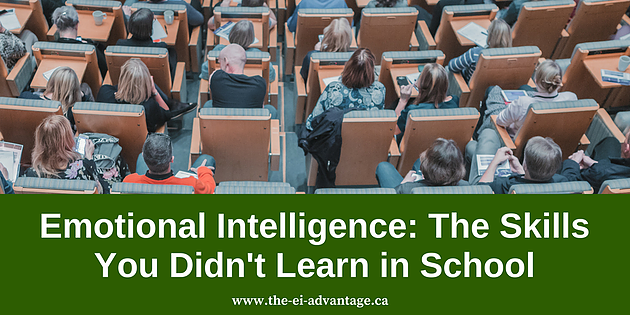Blog
Emotional Intelligence: The Skills You Didn’t Learn in School
July 31, 2017

In the classroom, most curriculums are the same: you learn science, mathematics, geography, and other valuable educational subjects. However, there is one important subject that is missing from the classroom.
Emotional intelligence, or EI, is a term used by psychologists that describes an individual’s ability to handle and read their own emotions, and how they react to the feelings of others. Obtaining and maintaining an understanding of your own EI provides you with life skills that you may not have thought as crucial, such as engaged listening, conflict resolution, and developing meaningful and healthy relationships with the important people in your life. These skills are indispensable, and include:
Self-Awareness
Being self-aware means that you are in-touch with your own emotions and feelings. When you’re self-aware, you’re more inclined to understand your limits and strengths, and communicate these feeling in an appropriate and well thought-out manner.
How to Increase Your Self-Awareness
- Maintain a journal of your own emotions. Every day, try and record your what happened that day, the emotions involved within your day, and how you dealt with these feelings. Through time, you’ll be able to notice connections between similar events and emotions, and consider better emotional avenues the next time you are encounter those feelings.
- Take a Break. When you don’t take time to process your emotions, they have a way of taking over, causing for knee-jerk reactions to problems or stressors. When you find yourself dealing with a strong emotion, pause and think about the situation before you react.
Self-Management
Self-management is the ability to take control of your emotions if they start to take over. Effective self-management of emotions allows you to better react to your own emotions and create healthy methods of dealing with your anxieties and emotional triggers.
How to Increase Your Self-Management Skills
Put your energy into something positive. When you find that you’re feeling down, overwhelmed, or lethargic, it is easy for self-pity to take over. But by changing your sensory input, or your environment, you can kick-start a more positive experience, and in turn, more positive emotions.
Empathy
Empathy is the ability to put yourself in another’s shoes. When you are able to read into the emotions of another and respond compassionately, you’re paving the way for trusting, healthy relationships, whether they’re personal or professional.
How to Get in Touch With Your Empathetic Abilities
Listen more, speak less. Active listening is the key to understanding another. You’ll never be able to understand exactly how another perceives their experiences, but by listening closely to what they say, you can imagine why the feel the way they do. Sometimes, all that a person needs to find a positive solution to a problem they’re facing is someone to truly listen to them.
Social Skills
Social skills, although a wide-reaching area of EI, involves using the above skills to cultivate positive interactions with the people in your life, such as coming to resolutions, managing a team in your professional environment, and coaching others through persuasive and effective communication.
How to Improve Your Social Skills
- Identify your emotions and how you best deal with them. As you communicate with another in a tough situation, identify how you’re feeling. If you can feel bottled-up anger or stress, take a break before you address the problem directly. Blow off steam in productive way, or take time to slowly explain exactly why you feel the way you do to another.
- Intend to end on a good note. For difficult resolutions within the workplace, enter the situation with the intention to cooperate and come to a peaceful conclusion. This involves being thoughtful in your communication methods, ensuring that you let the other side know that you want to work towards a common goal.
The team at Coaching iNSIGHTS offer in-depth, quality EI training for workplace teams who want to better these invaluable life skills. For more information on how EI training can contribute to a healthy workspace, contact us today.
